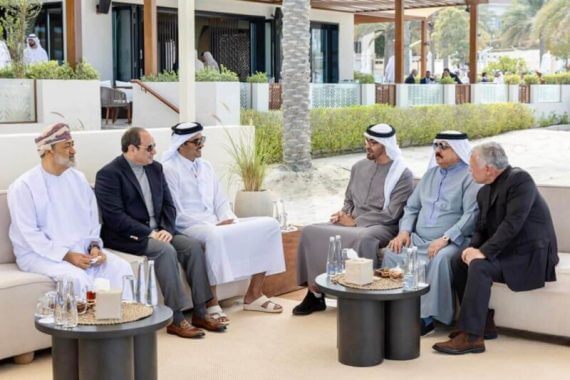A
multipolar regional order is in the making in the Middle East, the preponderance of the U.S. is waning and rising powers, primarily China and Russia, are deepening their involvement in the region. For the U.S., the Middle East has been losing its significance and the Asia Pacific region is considered economically and militarily more vital. The stable supply of oil from the Middle East is no more a top U.S. concern as the booming shale oil production in North America helps towards energy independence.
The badly ended invasions of Afghanistan and Iraq showed the limits of the U.S. power and influence in the region, which makes American policymakers less willing to play a major role in Middle Eastern affairs. The most recent escalation of violence between Israel and Palestinians in Jenin was met with mere calls for calm by the U.S. and President Biden so far has been quite unwilling to reinitiate the Middle East peace process. As the U.S. interest in the region diminishes, the rising powers of China and Russia are increasingly more interested in strengthening their ties with the Middle East.
The longstanding U.S. allies in the Middle East, Egypt, Israel, Saudi Arabia, the United Arab Emirates (UAE), and Turkey, are forming new intra and extra regional alliances. The Abraham Accords (2020) largely ended Israel’s isolation in the region, on an official level, as it established diplomatic relations with the UAE and Bahrain. In 2020, Morocco also recognized Israel and Sudan declared such an intention, which has not materialized yet. After four years of rupture, diplomatic relations between Israel and Turkey were restored in December 2022. Even Saudi Arabia’s relations with Israel are on the mend, though a normalization between the two is still not in the offing. In short, Israel is no more isolated officially and hence less dependent on the U.S. for its security.
Egypt, Saudi Arabia, Turkey, and the UAE are all establishing stronger ties with China and Russia. Egypt and China have fast growing economic and military ties, and Egypt is one of the major focus countries of China’s Belt and Road Initiative. The two countries call their relationship a “strategic partnership.” Saudi Arabia is strengthening its strategic ties with China. Chinese President Xi Jinping visited Riyadh in December 2022 and the two sides agreed that “they firmly support each other’s core interests” and would strengthen their partnership on energy and defense. President Jinping also met with representatives of other oil-producing Gulf states and the Arab League countries in the same visit, and called for the use of Chinese yuan, instead of U.S. dollars, in oil and gas transactions as he promised that China would continue its large volume oil imports from the region.
The increasing trade with the region is not simply driven by oil, there is also strong demand for the Chinese goods in the Middle East. Most strikingly, U.S.-banned Huawei technologies, such as its 5G equipment, are welcomed in the UAE and Saudi Arabia. The U.S. refusal to sell certain advanced technology weapons to a number of Middle East countries, along with Russia’s focus on its war in Ukraine, have led China to become “the secondary arms supplier of choice for many Middle East countries” in 2022.
Egypt, Saudi Arabia, and Turkey are already partners of the Shanghai Cooperation Organization’s dialogue. Russia is also making inroads in the region beyond its already entrenched regional alliances, e.g., with Syria. The Saudi-Russia cooperation is particularly strong in OPEC+, where both countries seek to cut oil supplies to prevent a drop in oil prices. Saudi Arabia’s oil alliance with Russia is a serious concern for the U.S., and American policymakers argue that this alliance benefits Russia for continuing its invasion of Ukraine. Egypt and Turkey also have close ties with Russia.
Turkey’s purchase of the Russian-made S400 air defense system and the ongoing construction of the first Turkish nuclear power plant by a Russian state-owned company are notable examples of the strengthening Turkish-Russian relationship. In July 2022, Egypt and Russia signed a deal for Egypt’s first nuclear power plant to the chagrin of the West, which has placed economic sanctions on Russia due to the war in Ukraine. Both Egypt and Turkey have maintained neutrality in the Russia-Ukraine war and chose not to implement any economic sanctions against Russia. That’s also the case with all other major U.S. allies in the Middle East: neither UAE nor Israel or Saudi Arabia has taken sides in the war.
China maintains a close relationship with Iran, the main U.S. rival in the region. The trade between Iran and China provides Iran with the badly needed cash for its economic survival in the face of U.S.-led sanctions imposed on Tehran for its nuclear program. Although Iran is worried over China’s growing cooperation with Saudi Arabia, China has thus far managed to develop its ties with the two rival countries. The U.S. is particularly worried about China’s increasing cheap oil imports from Iran.
China weakens U.S. influence in the Middle East and Iran sustains its economy through trade with China. There is no reason for China and Iran to abandon such mutually beneficial trade. The relationship between Iran and Russia is also deepening as Iran supplies Russia with drones and other military equipment in its war against Ukraine, and Russia remains a key Iranian ally in countering the U.S.-led sanctions.
Recommended
Regional powers in the Middle East seem to have already benefited from the lessening of U.S. interest in the region. The growing ties with China and Russia enable regional actors in the Middle East to withstand U.S. influence. However, this does not entail a breakup of their relations with the U.S. Egypt, Israel, the UAE, Saudi Arabia, and Turkey are not going to part ways with the U.S. They are rather more likely to hold on to the middle ground, being neither fully committed allies nor rivals to the U.S. If that path is to be continued by regional actors, we may well be witnessing the emergence of a multipolar order in the Middle East, one that is not dominated by any external or regional player.
On the other hand, China’s growing influence in the Middle East is a fact that does not necessarily mean replacing the U.S. The Chinese are keen on improving their economic and trade ties with the Middle East, but there is no evidence of any plans for military presence in the region. The U.S. still remains the major power in the Middle East, though its influence is in decline. The regional actors in the Middle East are likely to exploit the U.S.-China and U.S.-Russia rivalries at the global and regional levels to strengthen their positions. A multipolar order in the Middle East is definitely not the guaranteed outcome of shifting alliances and growing ties between regional and rising powers, but it appears as the most likely option.





